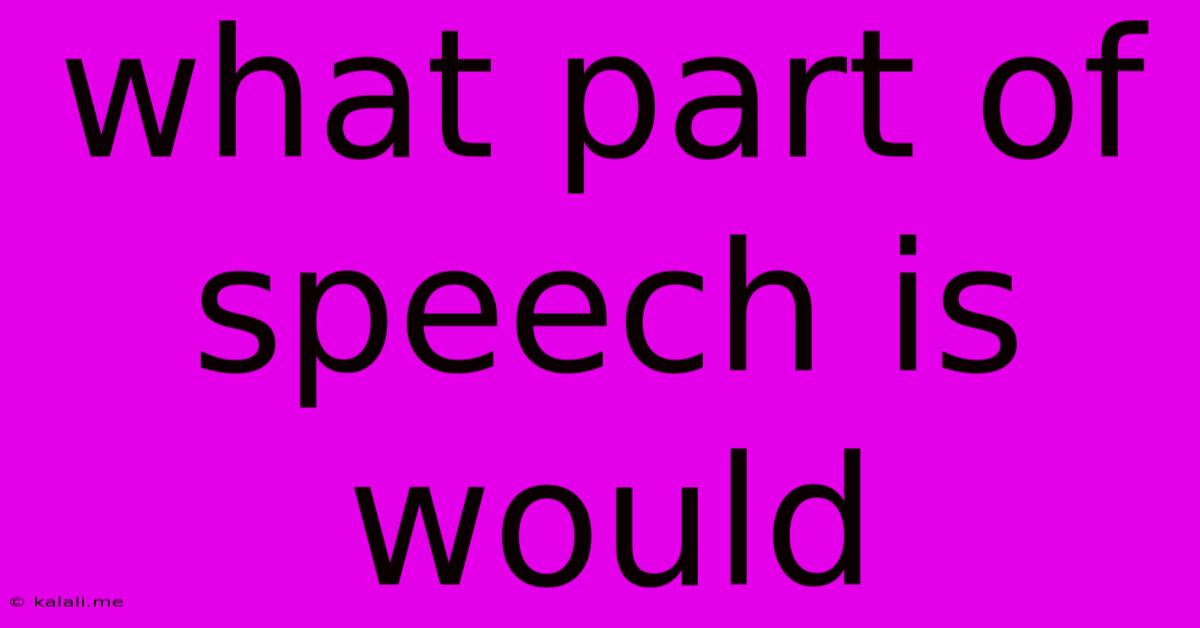What Part Of Speech Is Would
Kalali
Jun 04, 2025 · 3 min read

Table of Contents
What Part of Speech Is "Would"? Understanding the Versatile "Would"
The word "would" is a fascinating and versatile part of speech in the English language. While it's often categorized simply as a modal verb, its function and meaning are far more nuanced than that single label suggests. This article will delve into the various roles "would" plays in a sentence, explaining its different grammatical functions and providing clear examples. Understanding its multifaceted nature will significantly improve your writing and comprehension skills.
"Would" is primarily classified as a modal auxiliary verb. However, unlike other modals like "can," "could," "may," and "might," "would" carries a heavier weight of meaning and stylistic implications. Its core function is to express conditional situations, polite requests, habitual actions in the past, and hypothetical situations. Let's explore each of these functions in detail.
1. Expressing Conditional Situations
This is arguably the most common use of "would." It's used in conditional clauses (often "if" clauses) to express what would happen under a specific condition.
- Example: If I won the lottery, I would travel the world. (This describes a hypothetical future action dependent on a condition.)
- Example: She would have gone to the party if she hadn't been sick. (This describes a past action that didn't happen because of a specific condition.)
2. Making Polite Requests
"Would" softens requests, making them more formal and polite than using a simple imperative.
- Example: Would you please pass the salt? (This is a far more polite request than "Pass the salt.")
- Example: Would you mind helping me with this project? (This phrasing is gentler and more considerate than "Help me with this project.")
3. Describing Habitual Actions in the Past
"Would" can depict repeated actions or habitual behaviors in the past.
- Example: When I was a child, I would spend hours playing in the garden. (This indicates a recurring action in the past.)
- Example: Every Sunday, we would go for a long walk in the park. (This describes a regular past habit.)
4. Expressing Hypothetical Situations or Wishes
"Would" can be used to express hypothetical situations or wishes, often related to the past or present. This usage often implies regret or a contrast to reality.
- Example: I wish I would have studied harder for the exam. (Expressing regret about a past action.)
- Example: I would love to go to Italy, but I don't have the time. (Expressing a wish or desire.)
5. Used with "Rather" or "Prefer" to Express Preference
"Would" pairs well with "rather" or "prefer" to indicate preference.
- Example: I would rather stay home than go out tonight.
- Example: I would prefer tea to coffee.
Conclusion: Beyond Simple Classification
In conclusion, while "would" is categorized as a modal auxiliary verb, its usage is far more complex and nuanced. It plays a crucial role in conveying conditionality, politeness, habitual actions, and hypothetical situations. Mastering the various uses of "would" is essential for effective communication in English, allowing for a wider range of expression and a more sophisticated writing style. Remember to consider the context to accurately determine its specific function within a given sentence.
Latest Posts
Latest Posts
-
Max Wattage To Charge Macbook Pro
Jun 06, 2025
-
How To Seal Window Ac Unit
Jun 06, 2025
-
How To Prove Circles Have Most Perimeter
Jun 06, 2025
-
Can You Heat Up Cold Brew Coffee
Jun 06, 2025
-
Darling In The Franxx Manga Nudes
Jun 06, 2025
Related Post
Thank you for visiting our website which covers about What Part Of Speech Is Would . We hope the information provided has been useful to you. Feel free to contact us if you have any questions or need further assistance. See you next time and don't miss to bookmark.